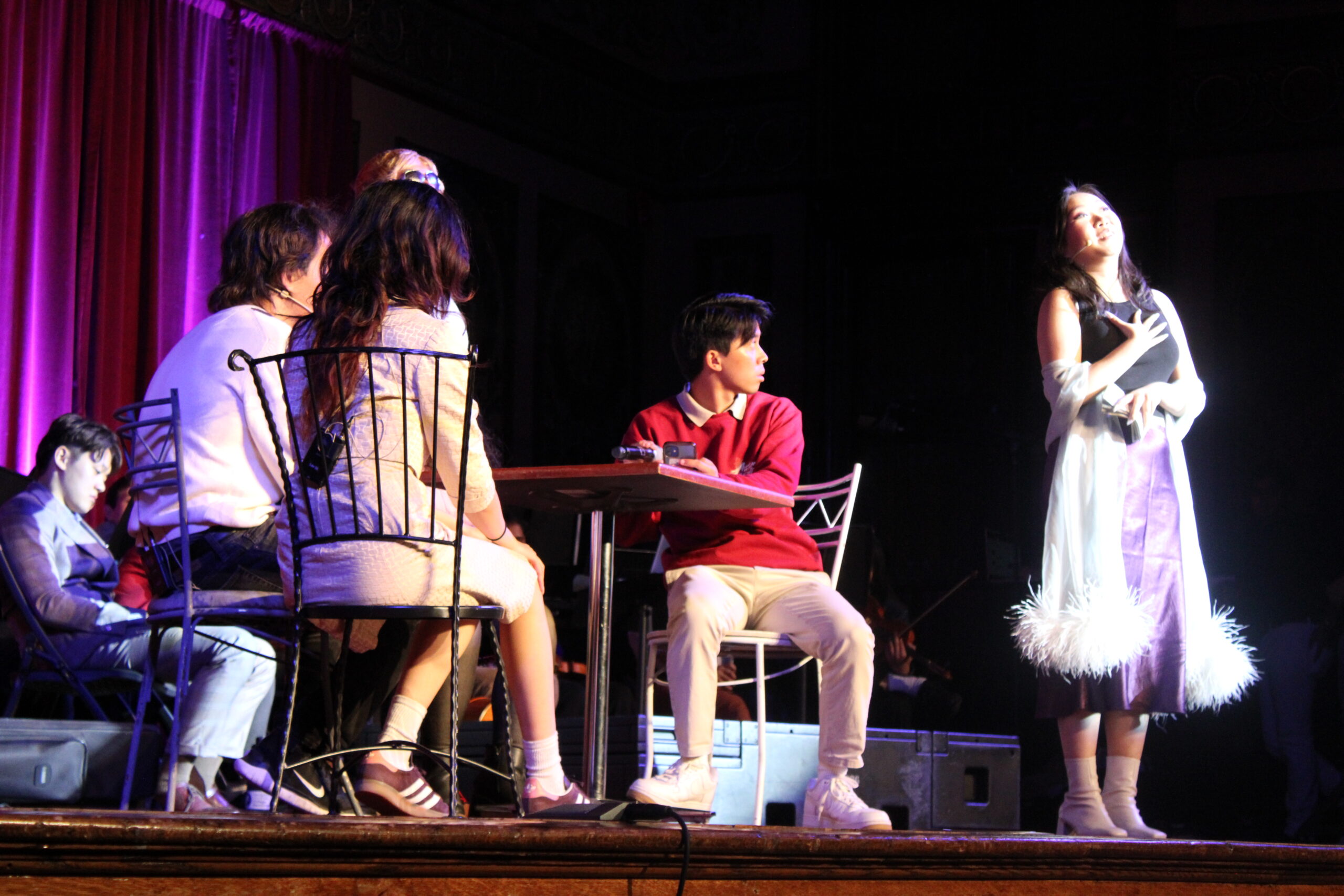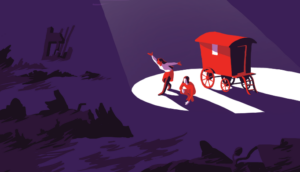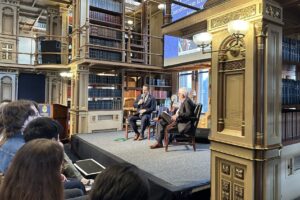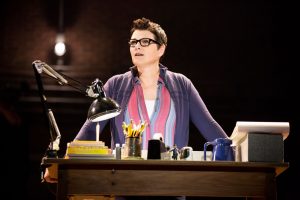It is 9 p.m. on a Wednesday in the middle of March and creative director Lucy Zhang (COL ’26) is untangling the significance of a project that demanded much of her time since the beginning of the school year. Students, like Zhang, took time away from schoolwork to write and learn a two-act script and original music. They spent midterms season in the basement rehearsal rooms of Davis Performing Arts Center (DPAC) as well as countless hours practicing and perfecting songs, scenes, and choreography.
“I mean, why would you do this?” Zhang asked.
At a school where pre-professionalism runs rampant and Google Calendars make sure every part of the day is optimized, it can be hard for students to find time for creative projects.
But for Zhang and the team behind Autumn Leaves, an original show produced from the experiences of Georgetown’s Asian American community, the long hours are worth it. The two-act musical, which premiered in Gaston Hall on April 4 and 5, tells the story of two siblings who must work to save their family jazz bar while learning secrets about their family’s past. The show explores legacy, responsibility, and family belonging, encapsulating the personal experiences of those involved while giving them a forum to explore—or re-explore—their creative side.
Autumn Leaves is the second original musical written and produced by (no) Pressure Creatives, a new Georgetown student group seeking to promote Asian American involvement in performing arts.
“We have a lot of theater groups on campus, a lot of productions. Many of them feature a lot of predominantly-white castings,” Sherri Wu (SFS ’26), Autumn Leaves director and co-scriptwriter, said. “In order to encourage more Asian Americans to be like, ‘Hey, this is something that you can explore and pursue in college,’ we want to create a space that makes it feel safe and welcome for them.”
The group takes its name from (no) pressure, the original musical brought to life last spring by many of the people involved in Autumn Leaves.
(no) pressure began with the idea to write and produce a two-act musical written entirely by Asian American students. The decision to cement this legacy by creating a dedicated Asian American performance club was inspired by recent strides made in film and media representation, as well as the noted lack of space for Asian Americans in campus theater.
“We live right now in a decade that’s really good for Asian Americans in media,” producer Lucas Lin (SFS ’24) said, bringing up films like Shang-Chi and the Legend of the Ten Rings (2021), a blockbuster hit that brought an Asian American story to the Marvel franchise, as well as Everything Everywhere All at Once (2022) and Parasite (2019), which generated Oscar wins.
Last fall, (no) Pressure Creatives underwent the first steps in applying for official recognition. The process has stalled since then, requiring a renewal of the procedure this semester. Despite the red tape, there has been plenty of support from students, professors, and theater department staff, members said.
Sitting in on the Autumn Leaves March 17 rehearsal, it’s clear why this creative space is a cherished community.
On the Sunday afternoon, sunlight spilled in through DPAC 026’s wide windows, anointing the lengthy rehearsal with a golden glow. Nearly all of the floorspace was put to use—on one side of the room there was a makeshift pit for the band, against another wall the actors gathered, and in a corner, the directing staff set up camp. In the middle of the room, the show came to life on a makeshift stage. Shifting arrangements between scenes, chairs and boxes gave the impression of a jazz bar, a living room, and a rainy Seattle street—the cast could not practice in Gaston until the week of the show.
The presence of the rest of the cast and crew was felt throughout the rehearsal—it is truly a community that put this production together. They reacted with oohs and gasps to a pivotal scene between two actors in which crucial information is revealed, and clapped after Christian Kim (CAS ’25), who plays Elliot, one of the co-leads, finished his solo jazz ballad.
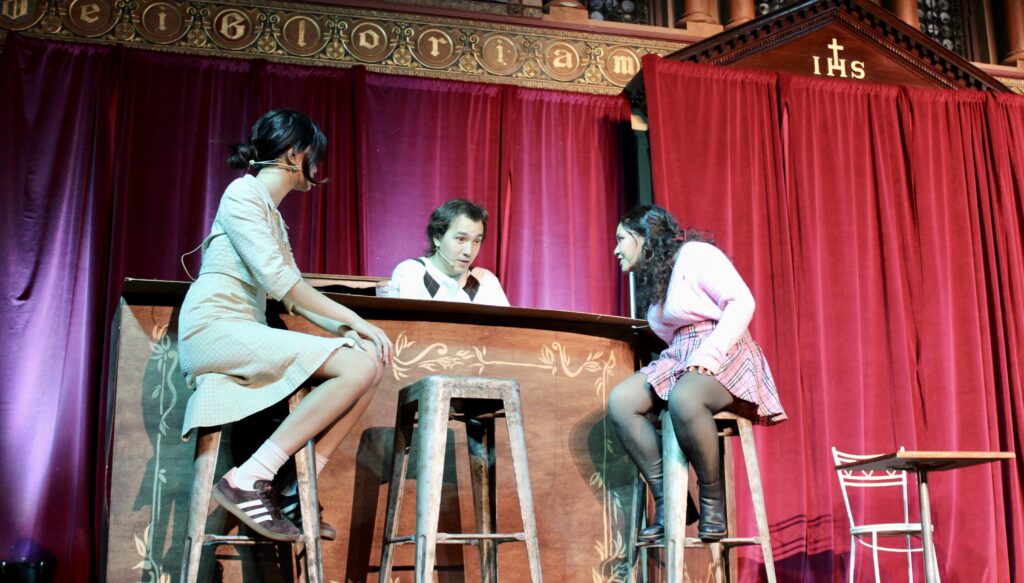
Photo by Izzy Wagener At their late parents’ jazz bar, Elliot (Christian Kim (CAS ’25)) tells his sister Lena (Mara Goldstein (CAS ’27)) an important piece of information he just learned from Renee (Amanda Jin (CAS ’27)).Photo by Izzy Wagener
Moments of fun in between rehearsing scenes also emphasized the close-knit community. In one moment of downtime, a few members of the band started playing the credits tune from The Office, eliciting delighted laughter from others when they recognized the theme. In another moment between scenes, the actors playing leading siblings Elliot and Lena, as well as Renee, the woman who assists them with reopening their family jazz bar, danced on a makeshift club stage. Together they moved to the music and enjoyed the moment before reentering the world they were creating.
In bringing Autumn Leaves to the stage, (no) Pressure Creatives’s artists took lessons from last year’s production—which Lin describes as “scrappy”—such as streamlining the scriptwriting and audition process.
“[(no) pressure’s production staff] had to learn how to produce a musical; something they had never done before, which meant that meetings and rehearsals would go over. They had to write and rewrite songs two days before the show,” Lin said, reflecting on the first year.
This year’s production process has not been without challenges. (no) pressure was produced as an offshoot of Georgetown’s Asian American Student Association (AASA), but in order to reinforce that (no) Pressure Creatives was to be a separate club, the executive suite made the decision to detach themselves from the affinity group this year. As the organization is still in the process of applying for official co-curricular club status, Autumn Leaves has had to work within the constraints of a smaller budget and lack of access to Georgetown’s dedicated theater spaces.
“For the first couple of rehearsals, we kind of just camped in McShain,” Wu said.
Eventually a connection with a friend in a Theater and Performance Studies class allowed them to gain access to the rehearsal spaces in DPAC, but uncertainty remained due to competition over room reservations.
This year’s production premiered in Gaston Hall, which, while ranking high among Georgetown’s most iconic spaces, is not ideal for a musical. Lacking built-in sound or lighting systems, (no) Pressure Creatives hired a company to install the lights and sound equipment in the auditorium; combined with the cost of renting Gaston for two nights, the majority of the budget went towards costs that they wouldn’t need to worry about if they had official recognition. In future productions, Lin hopes that as an officially recognized club they will be able to partner with Georgetown’s other co-curricular theater groups to perform in spaces created exclusively for theater performances.
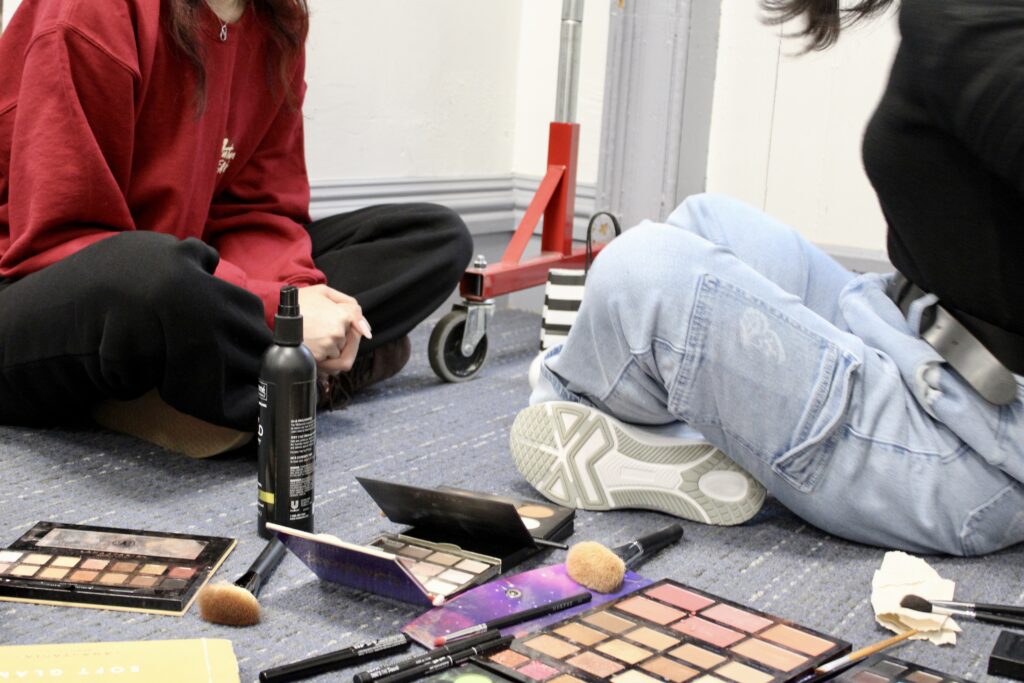
Photo by Izzy Wagener Amanda Jin gets her makeup done before a dress rehearsal in Gaston Hall.Photo by Izzy Wagener
Autumn Leaves’ creatives explored a variety of avenues to cut costs, partnering with Georgetown Reuse to acquire costumes and crowdsourcing props from the community. But there is a silver lining to these financial struggles: a chance to witness the collaboration of Georgetown affinity groups.
“It’s really nice to feel how supportive all the affinity groups on campus are. People are really willing to help each other out to the best extent possible,” Zhang said. “Finance is a barrier, but it shouldn’t be a barrier for people to get creative.”
Intended to serve as a gateway into Georgetown’s theater community, (no) Pressure Creatives welcomes students with little-to-no theater background, as well as those with past experience. As an original musical, students have the opportunity to try their hand at scriptwriting and songwriting, as well as more traditional performance roles. This is a collaborative community; the script, co-written by Wu and Wyatt Nako (CAS ’26), went through multiple rounds of feedback with a variety of people to ensure the script was representative of the Asian American experience.
Lin emphasized the importance of this space. Many Asian American students grew up fostering artistic talents that they left behind once reaching university, he said.
“I think it’s so unique, especially among Asian Americans, because a lot of us have this really ubiquitous experience of being very classically trained or being trained in a lot of music or performing arts at a younger age, but then not really going it—or it’s probably pretty uncommon to go into it—as a profession seriously in college,” Lin said.
Autumn Leaves offers a range of time commitments, making it manageable for those who are already juggling other extracurriculars but want to get involved. Wu joined (no) pressure last year as a dancer, allowing her to connect with an artistic activity she had enjoyed in the past, without having to spend the amount of time a dance club would demand.
At a school where less than 0.9% of students go into performing and fine arts and posters for pre-professional clubs dominate dorm bulletin boards during “hiring season,” (no) Pressure Creatives offers a sorely-needed creative outlet, members said.
“It’s because Georgetown doesn’t have a strong foundation [in the arts] that we see the problem and we feel inspired to do something,” Zhang said. “This is my getaway on campus, when I want to get away from walking around in a blazer and networking and all that. I think that’s why this project is more special to me: because it shows me that Georgetown can have people who want to do this. Georgetown can have a creative community.”
Being able to reconnect with her creative side has also been reinvigorating for Mara Goldstein (COL ’27), who plays Lena, one of the show’s leads. She found that her involvement in the show not only reconnected her to a love of acting, but also inspired her to return to other creative interests.
“Being a part of such a creative team has made me in turn a lot more creative. I’ve been writing again,” Goldstein said.
In addition to reconnecting with their artistic side, (no) Pressure Creatives creates a community for its members to bond through their shared Asian American identity.
“Being here, in a predominantly white institution, and around a lot of white people in general, has me thinking a lot about what does it mean for me to be an Asian American person, what are some experiences that I have, where do I feel most at home, things like that,” Goldstein said.
She also emphasized the importance of the representation that Autumn Leaves provides, citing how her own experience watching Raya and the Last Dragon (2021) showed her the personal value of seeing characters who reflected her own background.
“I think that there’s such a fun, such a strong message that you can portray by having a cast full of Asian Americans and trying to tell these stories that matter so much to us.”
Zhang had a similar experience.
“Coming to Georgetown made my Asian identity matter more to me,” Zhang said, noting that the transition from her more diverse high school to Georgetown’s predominantly-white student body was jarring. Her experience last year as assistant director of (no) pressure, as well as her current role as creative director of Autumn Leaves, has given her access to a community of people—and friends—who share her background and experiences.
Zhang also found the musical to be deeply impactful. Wanting to see her family’s experiences included in the show, she requested a scene in which two of the characters—recently arrived immigrants—struggle to deal with American bureaucracy; it was incorporated into the play.
“I really wanted there to be a scene where the parents are learning to deal with American bureaucrats,” Zhang said. “That’s such a central part of when I came here and my parents didn’t speak a lot of English and I was doing all the talking. If you want to talk about an immigrant story, I feel like you have to include something like that.”
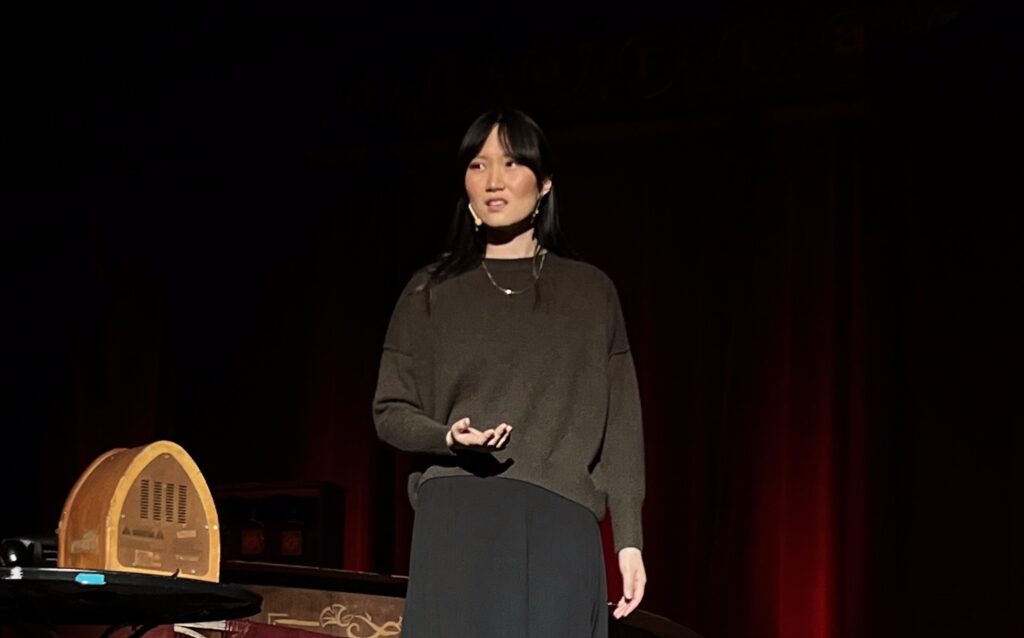
Photo by Eileen Miller Ella (Wonnie Kim (SOH ’25)), mother of the play’s protagonists, soliloquizes about the struggles of pursuing her and her husband’s dreams after immigrating to the United States.Photo by Eileen Miller
The production holds a special place in Wu’s heart as well. Although she’s unsure if she can make the same time commitment as directing, she’s certain that she will be involved in some capacity next year.
“(no) pressure gave me so much last year, and I want to give it back, like what it has given to me to freshmen, or just anyone who wants to get involved,” Wu said.
Throughout this semester—and for those on the producing side, this year—Autumn Leaves’ creatives dedicated countless hours to a project that allowed them to reconnect with their Asian American identities and creative interests. And for everyone involved, that makes the process completely worth it.
In answering her own rhetorical question of “why would you do this,” Zhang knows it is for the right reasons.
“It’s for the community: to have an Asian creative space on campus, which we didn’t really previously have.”

